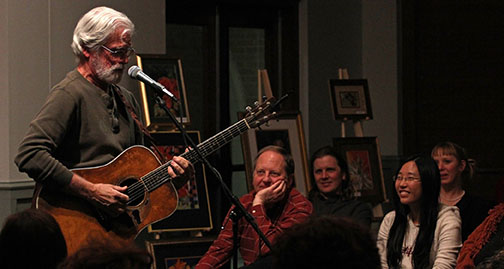“No baby ever learns to talk from taking a class.”
Mike Reiss, writer for The Simpsons
11/14/2018–We try too hard to “teach” rather than let people “learn.”
While interviewing a renowned guitarist about how he was going to lead a string workshop, I was surprised and gratified that he reinforced my education theory you can’t teach anyone anything.
“I’m not good at teaching the basics, not good at that at all,” said Jack Williams a guitarist who has played and recorded with such music icons as Peter Yarrow, Mickey Newbury, and Harry Nilsson. “My whole emphasis is not on technique, but on the music itself. It’s about the creative process; how do you think about the music?”
Now that is a radical comment.
I spent 30 years in education, from teaching kindergarten, to middle school science, to running one of the most recognized community and adult education programs in the country. In almost every type of accepted, approved educational method, the emphasis IS on teaching technique.
Along comes a guy who says if you are learning to play an instrument by memorizing chords and practicing scales, you are doing it wrong.
“Most beginners just learn rote chords and rote scales,” Williams said, “but they never learn how to fit them together or never learn to make them work together to make a piece of music come into being. That’s what I try to do.”
Williams illustrated by describing the process he used to teach mandolin to the most difficult student anyone in the world can take on–their own spouse. He doesn’t even call it teaching; he calls it “guiding my wife on teaching herself mandolin for the last six years.”
“We started from scratch,” he explained. “I basically showed her how to know what she was doing, how this chord moved from this to this, and how to play melody lines over it.”
What did he NOT teach her?
“I never taught her to put your fingers here, hold the pick like this, strum like this.”
His whole goal in teaching music is to prepare the student to walk into a roomful of other people playing music, and know enough about what’s going on that they can participate.
Williams’ ultimate goal is to get the musical idea from inside the musician’s head and out through his fingers to his instrument, putting it together to where it can be considered a “performance.”
“How many people do you know who sit with a guitar and say I hear all this great stuff in my head, but I can’t play it?” he asked. “That’s a big deal. I try to devise ways for people to get an idea from their head to their hands. It doesn’t have much to do with the instrument. I talk about what you are hearing in your head and help make it happen on guitar. That is ear training.”
I related an experience in my journey to learn to play violin late in life. Of course I obsessed over technique–hold the bow thusly, proper posture, placement of fingers on the neck, even proper adjustment of the chin rest. But the best I ever played–ever–was the concert where a conductor told us to forget about technique, just play the music. I soared! At least in my mind. I was playing Handel, not running scales. Sure I missed notes, but it didn’t matter. That is exactly the right approach, according to Williams.
“Most people are focused on doing it ‘right,’” he said. “A student can play Bach’s Jesu, Joy of Man’s Desiring and maybe screw up a couple of notes. At the end, what does she mention? Those two notes. But she forgot about the 465 correct notes.”
To prove his point, Williams points out what we’ve all experienced. After neglecting to practice your instrument–or your tennis game–for a few days, you come back to it and play like you’ve never played before.
“When a musician lays off for several days, he comes back and just starts playing,” Williams said. “Everything sounds like it should–there is not time to worry about playing a part correctly. It’s a kind of Zen thing. It’s a letting go of all mental activity that stands in the way of making music.”
Of course this is not to say you don’t practice. It’s more a way of saying that you change your expectations about learning.
“There are people who come to a music camp wanting specific technical things. They think that’s what they need, of course. They are wrong. Yes, there are technical things, but there are other things that are never taught. I like to think that I can teach them those things. There will be people who say I don’t want all that creativity stuff. They want to know where to put my fingers so I can play a lick. Well… those folks… I can’t help.”
Details:
More information on Jack Williams is at www.jackwilliamsmusic.com.
